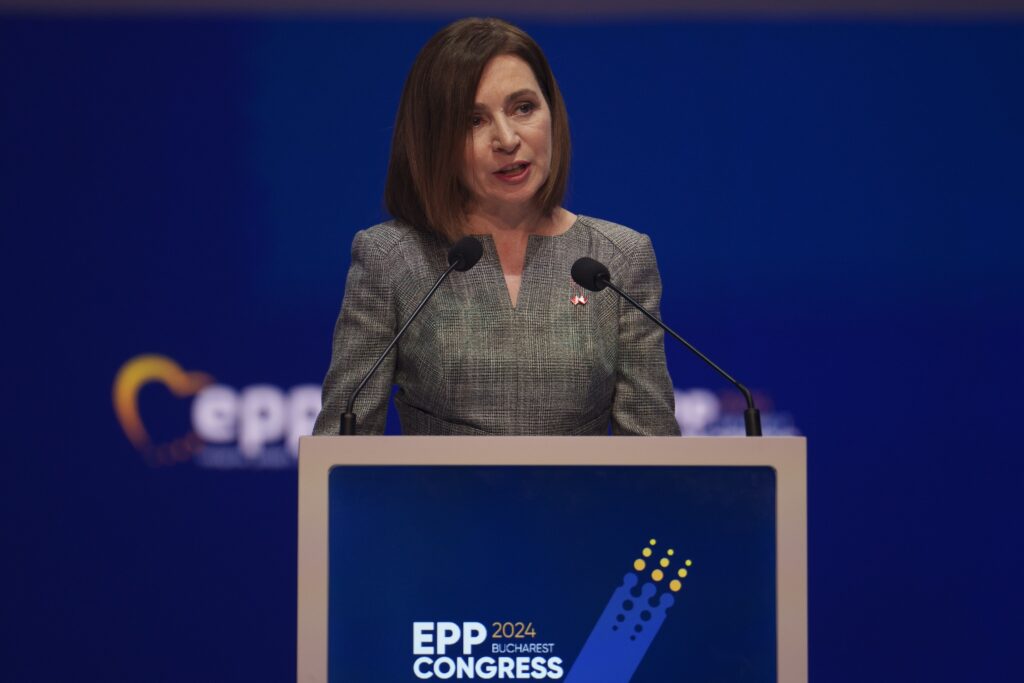Russian President Vladimir Putin wants to provide “assistance” to pro-Russian proxies in Moldova, a Kremlin spokesman acknowledged amid widespread anxiety that Moscow intends to target Ukraine’s neighbor.
“They certainly need assistance in many ways,” Kremlin spokesman Dmitry Peskov said Wednesday, per state-run TASS. “Russia is open to provide this assistance, but we prefer settling all issues without any exceptions by means of a dialogue, a political dialogue.”
Russia has maintained a military presence in the Moldovan region of Transnistria for decades, over the central government’s objections, as Putin has declined to implement a pledge to withdraw the troops that his predecessor struck in 1999. Their presence has figured into the perpetuation of a sovereignty dispute that Moldovan officials regard as a potential predicate for Russian exploitation.
“The details point to strategies for 2024 and 2025 that involve supporting pro-Russian political actors with ties to the intelligence services, organized crime groups, and the Kremlin leadership,” Moldovan Intelligence and Security Service chief Alexandru Musteata said this week.

Moldovan authorities find some reassurance in Ukraine’s resistance of Russia’s full-scale invasion, as the performance of Ukrainian troops has prevented Russian forces from seizing the Ukrainian territory needed to form a land bridge between Russia and Transnistria.
“Thanks to the sacrifice of the brave Ukrainian people and the Ukrainian army … we are safe, although safe could be a strong word given the front lines are just 200 kilometers away,” Moldovan Foreign Minister Mihail Popșoi told Politico’s European affiliate this week.
Yet Russian officials and their Transnistrian associates have raised the specter of a crisis in recent days. The regional Congress of Deputies voted to ask Russia “to protect Transnistria in the face of increasing pressure” from Moldova. Russian Foreign Minister Sergey Lavrov subsequently stoked the controversy by ascribing to the Moldovan government the alleged policies that Russia claims justified the war in Ukraine.
“The Chisinau regime … is following in the footsteps of the Kyiv regime,” Lavrov said last week, using Moscow’s preferred slur for the Ukrainian government.
That combination of public messaging drew a word of warning from Secretary of State Antony Blinken’s team.
“So given Russia’s increasingly aggressive and destabilizing role in Europe, we are watching Russia’s actions in Transnistria and the broader situation there very closely,” State Department spokesman Matthew Miller told reporters Monday. “The United States firmly supports Moldova’s sovereignty and territorial integrity within its internationally recognized borders, and we continue to encourage Chisinau and Tiraspol to work together and identify solutions to pressing concerns of communities on both sides of the Dniester.”
Yet Moldovan and Ukrainian officials derided call-and-response between Transnistria as empty rhetoric.
“Nobody will be asking to join the Russian Federation,” Ukrainian military intelligence chief Kyrylo Budanov said. “This has all the hallmarks of a deliberate misinformation campaign designed to destabilize the region.”
CLICK HERE TO READ MORE FROM THE WASHINGTON EXAMINER
Still, Moldovan President Maia Sandu isn’t shying away from looking for Western security support. Sandu, who will run for reelection in 2024 while negotiating the terms of Moldova’s entry into the European Union, will meet with French President Emmanuel Macron on Thursday in Paris.
“A defense cooperation agreement and a road map for economic cooperation will be signed during the visit,” Macron’s team said before the meeting. “The president … will reiterate France’s support for the independence, sovereignty, and security of the Republic of Moldova, in the context of Russia’s war of aggression against Ukraine.”
